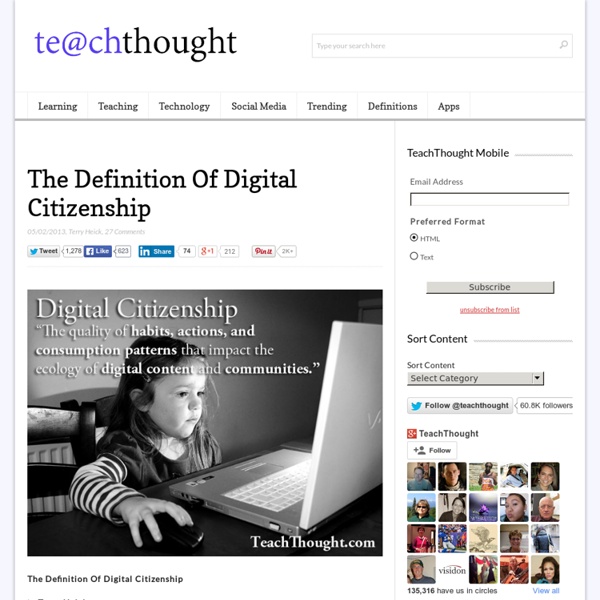Schools Should Be Teaching Kids How to Use the Internet Well - Abigail Walthausen
But outdated web filters make that mission quite difficult. Randy Snyder/AP Photo During this year’s State of the Union address, President Obama championed the goal of increasing bandwidth in schools across the country.
Home
Skip to content The Easy Guide to Socialising Online Home The Australian Government's Easy Guide to Socialising Online provides information on how internet users can protect themselves and their information when using social networking sites, search engines and online games Print version | Disclaimer | Privacy | Copyright | Freedom of Information | AccessibilityGlossary
Learning Theories Every Teacher should Know about
Have you ever asked yourself what learning theories you know about and which ones you feel more connected to and apply in your teaching ? Generally speaking, theories inform and guide practice in any content area and a learning theory is a set of concepts on how people learn. It is more or less an investigation of the strategies and the underlying cognitive processes involved in learning. The educational field abounds in learning theories to the extent that it becomes hard to draw clear boundaries between some of them. The graphic I have for you below provides a clear categorization of the learning theories you need to know as a teacher and educator.
flipped classroom
An excellent tool for your flipped classroom is EDpuzzle. With this tool you can crop a video to only use the portion you need for your specific class. Another feature is you can add your own voice by inserting audio notes or recording over the video. The embed quiz feature allows you to add questions at random points in the video to engage students and check their understanding of the material. With EDpuzzle you can locate video from a number of sources including Youtube, Teacher Tube, Khan Academy, TED and LearnZillion. Once complete you can upload your completed video to the EDpuzzle library.
All You Need is Less: The KonMari Test of Collection Strength
All You Need is Less: The KonMari Test of Collection Strength “Perfection is finally attained not when there is no longer anything to add, but when there is no longer anything to take away.”—Antoine de Saint Exupéry My maternal grandmother, like many others who lived through the depression, kept a lot of stuff. Sitti’s house was full of things with no rational reason for hanging on to, but it wasn’t until the leukemia ran its fatal course that my mom and aunt could finally clean up the place. I imagine many failed retail stores experience something comparable, where a shopkeeper wastes time and money stocking merchandise there’s no demand for, until the joint goes out of business and the wares are scuttled.
How Technology Enhances Creativity
I recently wrote a post about how marketers will need to learn to rely less on judgment and intuition in the era of big data. It’s a controversial subject, especially since many marketers pride themselves, in fact have built their careers, on having a reputation for instinct. So I expected a certain amount of pushback, but instead many people seemed to think that I was arguing that technology was diminishing the need for creativity in marketing. This is clearly not the case.
A Great Animation Explaining Digital CItizenship
Digital citizenship is an essential component of digital literacy. Being a digital citizen goes beyond knowing how to use technology and social media to respecting, sharing, participating and using the net effectively. Digital citizenship is a code of behaviour,an etiquette that organizes and protect our digital identity. It is a prerequisite for any plans of technology integration in education. Students need to learn how to use the web respectfully and in doing so they will also be learning the core of digital literacy.
15 Internet Trends That Are Changing How We Connect
15 Internet Trends That Are Changing How We Connect by Tom Vander Ark first appeared on gettingsmart.com Mary Meeker from leading venture capital investors Kleiner Perkins presented on internet trends at Stanford last week. It’s worth reviewing. The money quote: “The magnitude of upcoming change will be stunning—we are still in spring training.” Meeker lists 15 trends in support of this claim:



